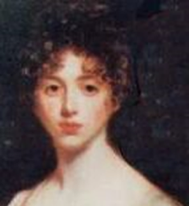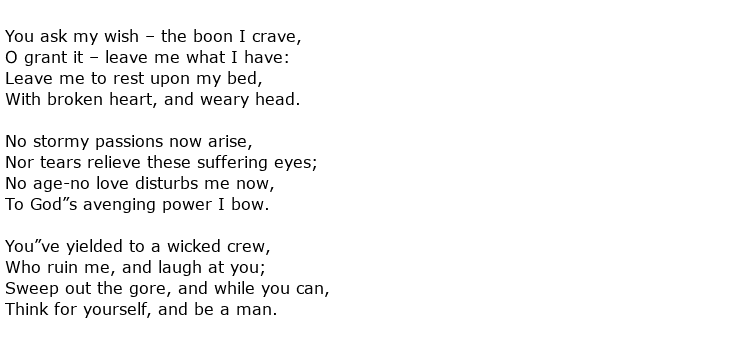 Lady Caroline Lamb was a colourful character in English society during the latter decades of the 18th and early decades of the 19th century. She was an occasional poet and novelist but is best known for an infamous, torrid affair during the year 1812 with poet Lord Byron. She was still married to the Hon. William Lamb, a man whose political career was not harmed by his wife’s excesses. He became Viscount Melbourne, and the British Prime Minister, but this was only after Caroline’s death. Her often outrageous, publicly bizarre behaviour was thought to be attributable to a gradual mental breakdown which would eventually overwhelm her.
Lady Caroline Lamb was a colourful character in English society during the latter decades of the 18th and early decades of the 19th century. She was an occasional poet and novelist but is best known for an infamous, torrid affair during the year 1812 with poet Lord Byron. She was still married to the Hon. William Lamb, a man whose political career was not harmed by his wife’s excesses. He became Viscount Melbourne, and the British Prime Minister, but this was only after Caroline’s death. Her often outrageous, publicly bizarre behaviour was thought to be attributable to a gradual mental breakdown which would eventually overwhelm her.
She was born the Hon. Caroline Ponsonby on the 13th November 1785 into an aristocratic Anglo-Irish family. Her father became the 3rd Earl of Bessborough in 1793 and her mother, the Countess, was equally well connected as well as being the cousin of Annabella, Lady Byron, a woman who was married to the philandering poet for a only a very short time. Caroline had a delicate constitution throughout her childhood and almost died of worm infestation in her gut during a visit to Italy with her mother. She was, perhaps, over-indulged by her mother and maybe that shaped her future conduct.
Her education was provided by private tutors and a governess who, it is believed, instilled a love of literature into her charge, being the daughter of a children’s author herself. Lady Caroline was soon demonstrating a witty talent for writing and further education at a London school taught her language skills. She also demonstrated a more than adequate portrait sketching ability. She was being well groomed for court life and, in 1815, she was married to an aspiring politician, the Hon. William Lamb and she was, no doubt, looking forward to become Viscountess Lamb when her husband inherited his father’s title.
It was a happy marriage for a number of years but suffered severe strain due to the fact that Lady Caroline lost her daughter at only a day old and her son, George, was born with severe mental problems. The Lambs decided to care for him at home rather than sending him away and this, along with the pressures of her husband’s political career, inevitably drove them apart. The two families did not get on well either so the marriage never really stood a chance. Perhaps all of this was the spark that ignited her well-publicised affair with the man who she dubbed “mad, bad and dangerous to know”.
Lady Caroline was clearly obsessed with Byron and they bounced poetry off each other at regular intervals. It has been said that she imitated his style in some way and, certainly, many of her poems were of the romantic genre. Many were written about, and for, her lover but she also wrote poetry for her husband, examples being

This latter piece is reproduced below and appears to be a rebuking message to a husband who, she may have believed, had ignored her needs in favour of furthering his own career:

While her relationship with Byron started off as a passionate affair on both sides it soon deteriorated with the pair drifting apart and Lady Caroline trying ever more bizarre ways to win him back, including trying to kill herself by publicly slashing her wrists at a ball where he was present. Her novel Glenarvon, published in 1816, reputedly included characters based on the pair. During the next seven years she had three other novels published along with many poems which were published either singly or for private consumption.
The Lambs separated in 1825 with Lady Caroline struggling with mental disorders for the rest of her days. While her husband was on government business in Ireland she fell ill, mostly as a result of excess consumption of the drug laudanum and alcohol.
Lady Caroline Lamb died on the 25th January 1828 at the age of 43. Her story was told in a 1972 cinema release with a stellar cast including Sarah Miles, Jon Finch and Richard Chamberlain. A further telling came in the 2003 BBC drama simply called Byron.

